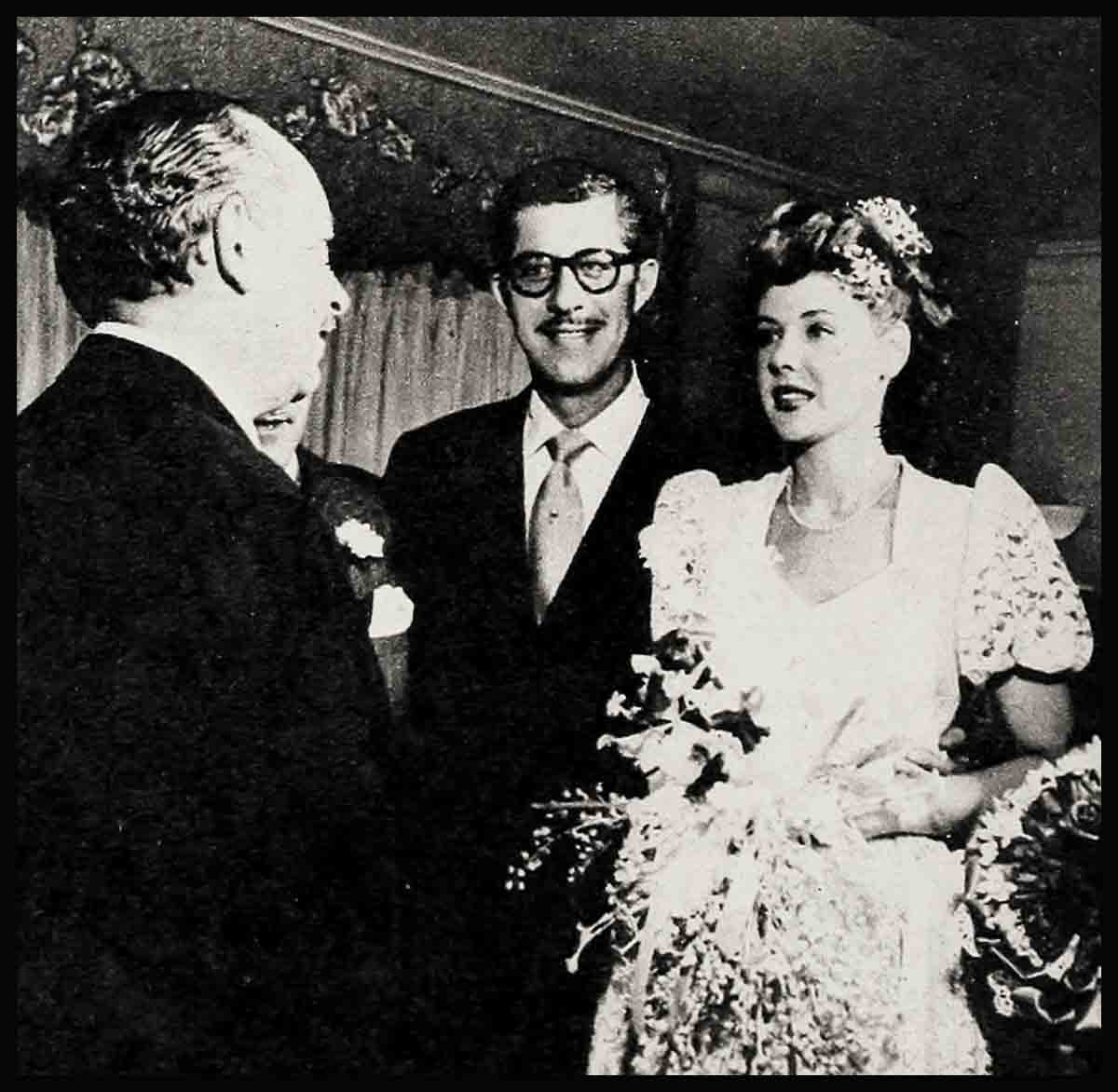
With This Ring . . . —Marie McDonald & Harry Karl
Some diamond!
It’s large. Octagon shape. It’s the purest blue-white diamond that money can buy.
The man who gave it to her designed it himself. Also the wedding band, which is a complete circle of baguette diamonds, with the clasps concealed so you can’t see the platinum—just the diamonds. The rings show a lot of thought on the part of a highly successful business man who understands romance.
And Marie McDonald Karl deserves them.
I’ve known Marie ever since she came to Hollywood in 1941. She was a brunette then, and a touch famous from being chosen “Miss New York State” a couple of years before. With time out for a blonde interlude, she’s a brunette now and several touches more famous because of her role as Meriam in Guest in the House, and her Metro contract which led up to the role opposite Gene Kelly in Living in a Big Way.
Marie McDonald is beautiful. She’s “The Body” all right.
But on the mental and spiritual side, she is not the slightly brassy, half-dumb, half-smart character she portrays on celluloid.
She thinks.
She is charming, considerate and intelligent.
She proves that by the way she talks about the man in her life. “I want to tell you about Harry Karl,” she said. “I don’t want to sound drooly and sentimental, even though I am knee-deep on the latter point.”
So Marie told me about Harry Karl, who is six feet, one inch tall and the successful owner of a chain of 200 shoe stores which bear his name.
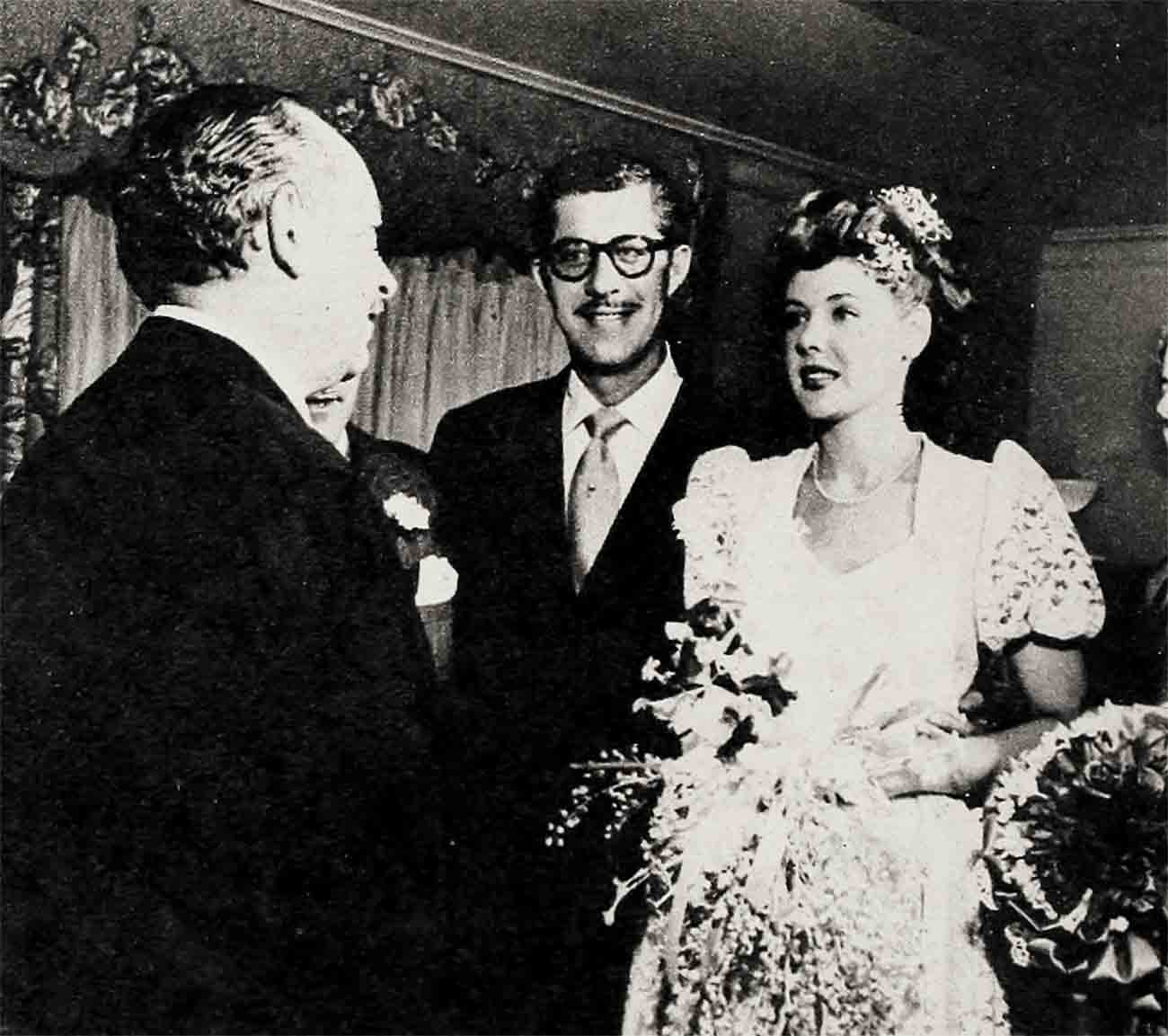
It’s always amazing the way romances start. They’ll blossom out of some trivial incident, such as Marie and the time a year ago when she was in desperate need of bubble gum.
“I’ve just got to get my hands on some bubble gum,” she told producer Ralph Friede. “I promised Pan Berman’s children and they’ll never forgive me if I let them down.”
“That’s easy,” Friede told her. “I know a fellow—and it just happens that he’d sort of like to meet you.”
He sort of did.
When Harry Karl brought the bubble gum around, he began to court Marie.
Their friendship was the quiet, sensible kind that is pretty rare in Hollywood. So rare that when news of Marie’s impending marriage was announced, people kept saying, “Oh, it’s just one of those things. They won’t really do it.”
They won’t really?
But friends, they already have.
They were married at Harry’s family’s home, in West Hollywood, at 6 p.m. of a bright September day.
The best man was Irwin Myers, Harry’s oldest friend. The matron of honor was Mary Cunody, Marie’s closest pal.
But you couldn’t see anybody else for the dazzle that was Marie. She wore a ballerina-length lace gown, lilies of the valley in her soft brown hair, and her bridal bouquet was white orchids and lilies of the valley.
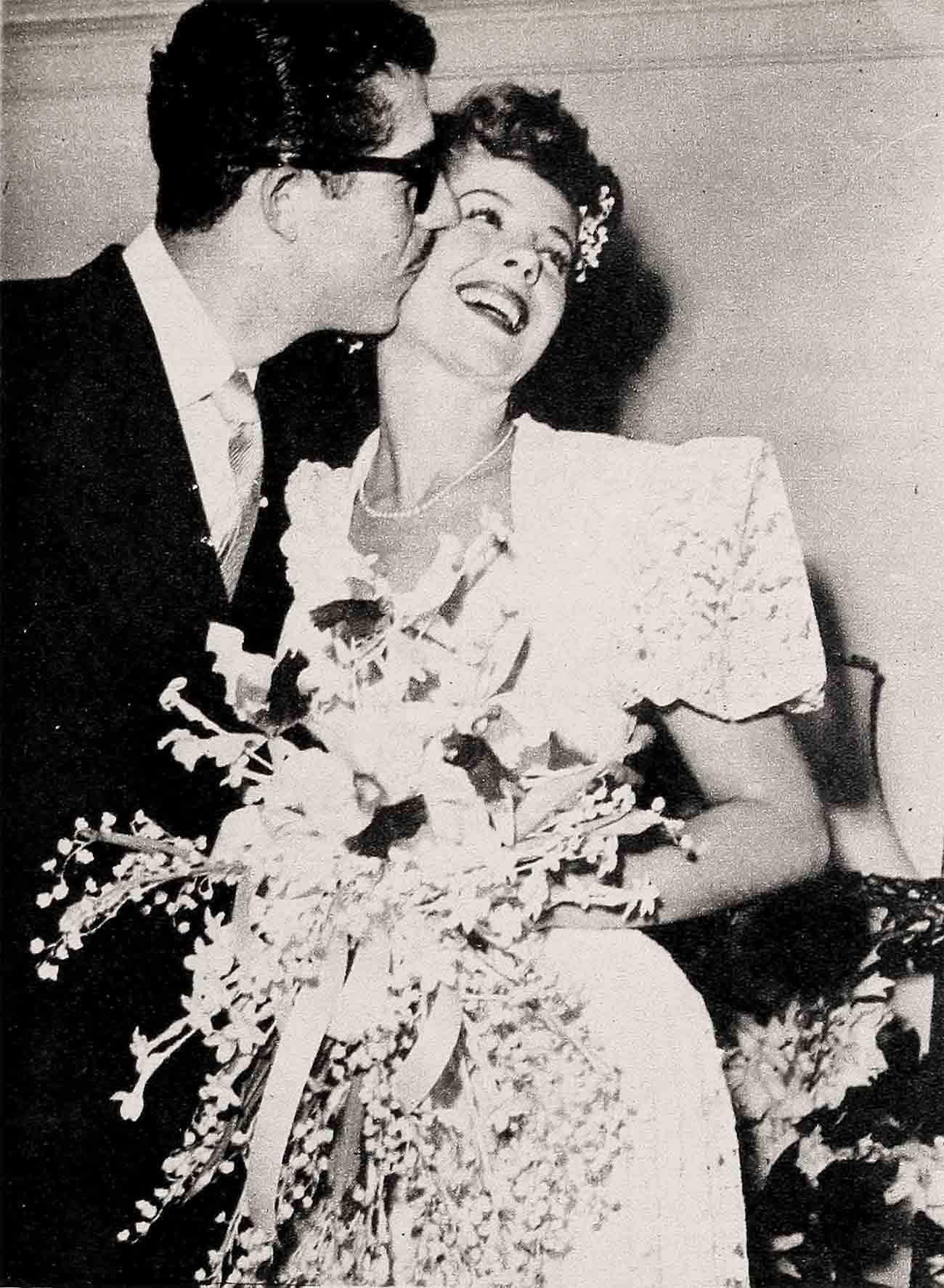
It was a small, simple ceremony. Marie’s father gave her away, and nobody cried, and nobody pitched any shoes, and afterward, there was a little, informal reception in Mocambo’s Champagne Room. A few friends came; mostly non-professional friends, and there wasn’t any cake, but nobody seemed to miss one.
It was right; it was quite perfect.
“And later, we’ll take a trip East,” Harry said.
So you thought they wouldn’t get married? You were wrong!
lost and found . . .
Marie first put on her engagement ring July ninth, her birthday. She was sitting with friends at Mocambo, when she noticed that her gold compact was missing. She excused herself, and went to the ladies’ room to look for it. She returned, dejected, only to find the missing compact on the table cloth in front of her.
Inside was the diamond.
Not long ago, Marie went to see a doctor. “I don’t know what’s the matter with me,” she told the eminent medical authority. “I must be losing my pep. I feel listless, and it bothers me.”
The doctor suggested vitamin pills.
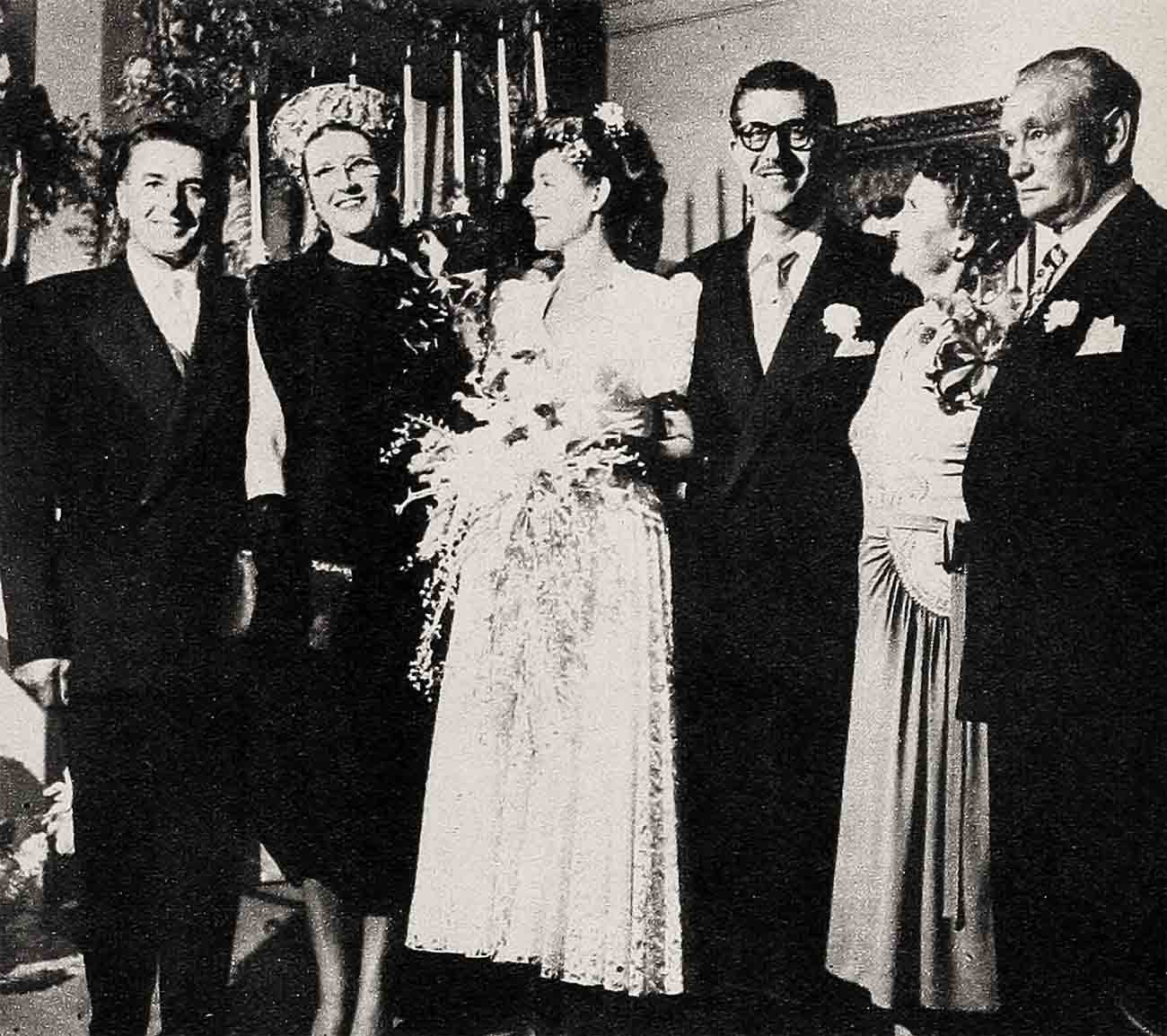
The next day, Marie’s guest house burned down. She lost her wedding dress and a prized scrap book. She had to scurry around seeing insurance men, getting a new wardrobe and preparing for a new picture. A couple of her relatives went to the hospital.
“So what happened? I forgot to take the pills. My pep came back. It’s when I stop doing things that I get tired.”
She must be right. This year, Marie did a picture that took nine months to shoot. She’s gone to Mexico, made personal appearances, and been a bride.
“It’s nothing, really. You should get to know Harry better. The man hasn’t had a summer vacation since he went into business, and before that he studied law—got his degree when he was twenty.”
Listen to Marie talking about Harry Karl and you have a better an television picture of what she’s like.
“I think we have a companionship that is very important to our marriage. Harry is a baseball and football fan. I’m not. I go to a game, sit there and do crossword puzzles. It’s not an affectation. I just don’t care for either sport. But I like to be with Harry, and he doesn’t call me a dope for not learning the rules and pretending to be excited when I’m not.
“Next spring I’m going to bother Harry until he takes a real vacation. He wants to go hunting. He never had time for it when he was young. I love to ride and shoot, and that will get us off to a flying honeymoon—the kind we can’t have right now because of business.
“Another thing. Harry refuses to have anything to do with my career. He doesn’t make an issue of it—just says that it’s my affair, and if it makes me happy, that’s fine. While I was on a personal appearance tour, he flew in for a couple of weekends. I’ve never seen him really riled, except once. That was when an agent asked him to get me to do something I’d already turned down. It was wonderful, the quiet way he told the character off.”
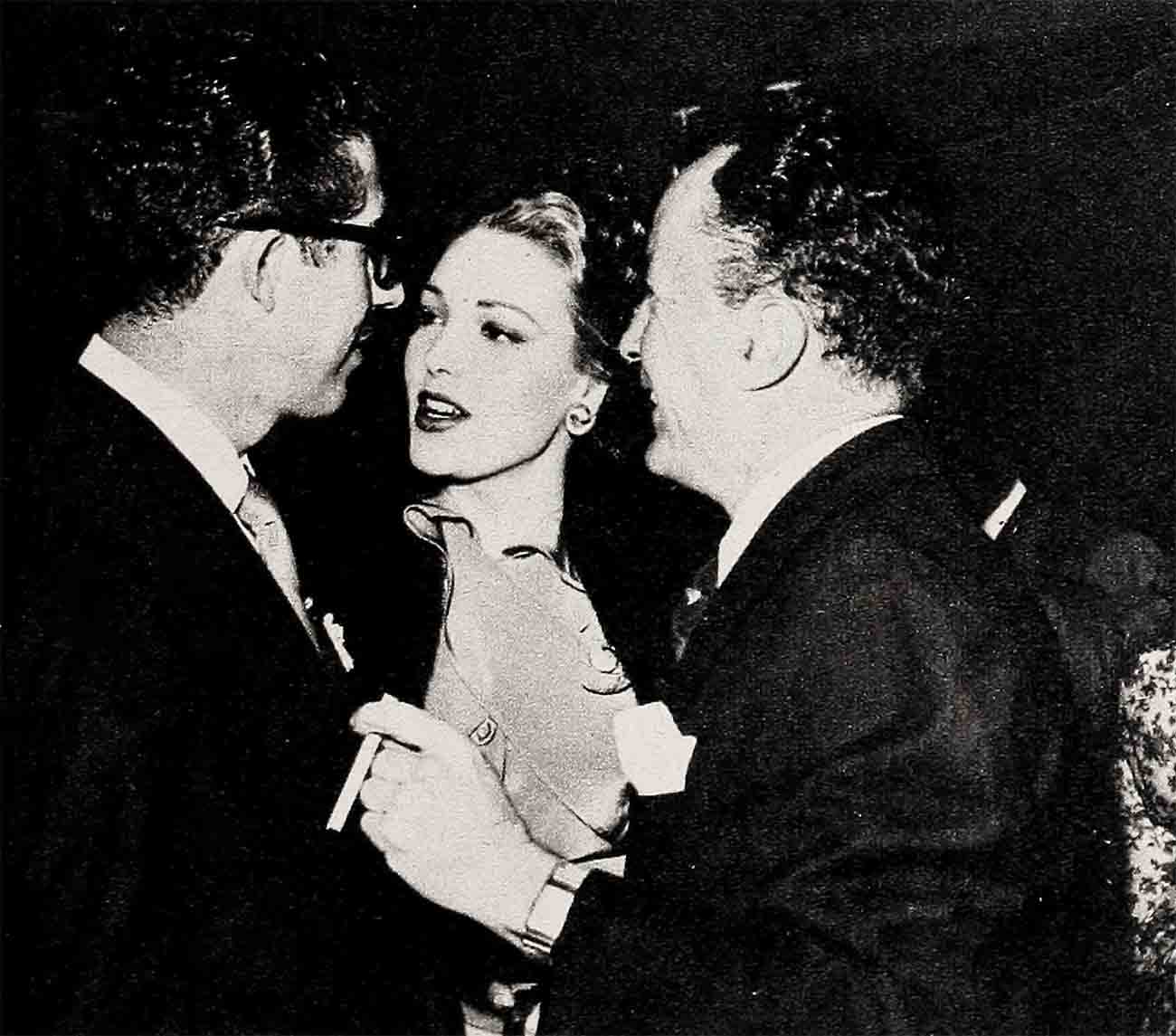
standing room only . . .
About those personal appearances: Marie should feel pretty good.
Two celebrities preceded her for a week at the Oriental Theater in Chicago. Together they did $37,000 at the box office. Marie’s first week rang up the cash register for a neat $60,000, and her second week was a sparkling $78,000. With Perry Como just across the street for competition.
I was remarking on this, as I reached for a cigarette.
“That makes four you’ve had this noon,” Marie said, “and three cups of coffee. You just can’t do it, that’s all. Listen, before I grew up and knew better, I thought I was a busy person. I smoked all the time. Drank quarts of coffee.
“Then one day I got out of bed and fell flat on my face. I was scared to death. Thought I had heart trouble, but do you know that you can get a false angina that way? Don’t get the idea I’m making a case against the cigarette and coffee people, but just drop a word to the rest of the young people that easy does it.”
People who meet Marie are continually being surprised. They expect her to loll around being elegantly beautiful. She doesn’t loll, she isn’t elegant, and she’s downright interesting as a person.
There’s a famous actress who could take a tip from Marie. The woman always gazes over people’s shoulders as she talks. Never looks anyone directly in the eyes. Marie does, and her gray-green, smoky eyes are wonderful.
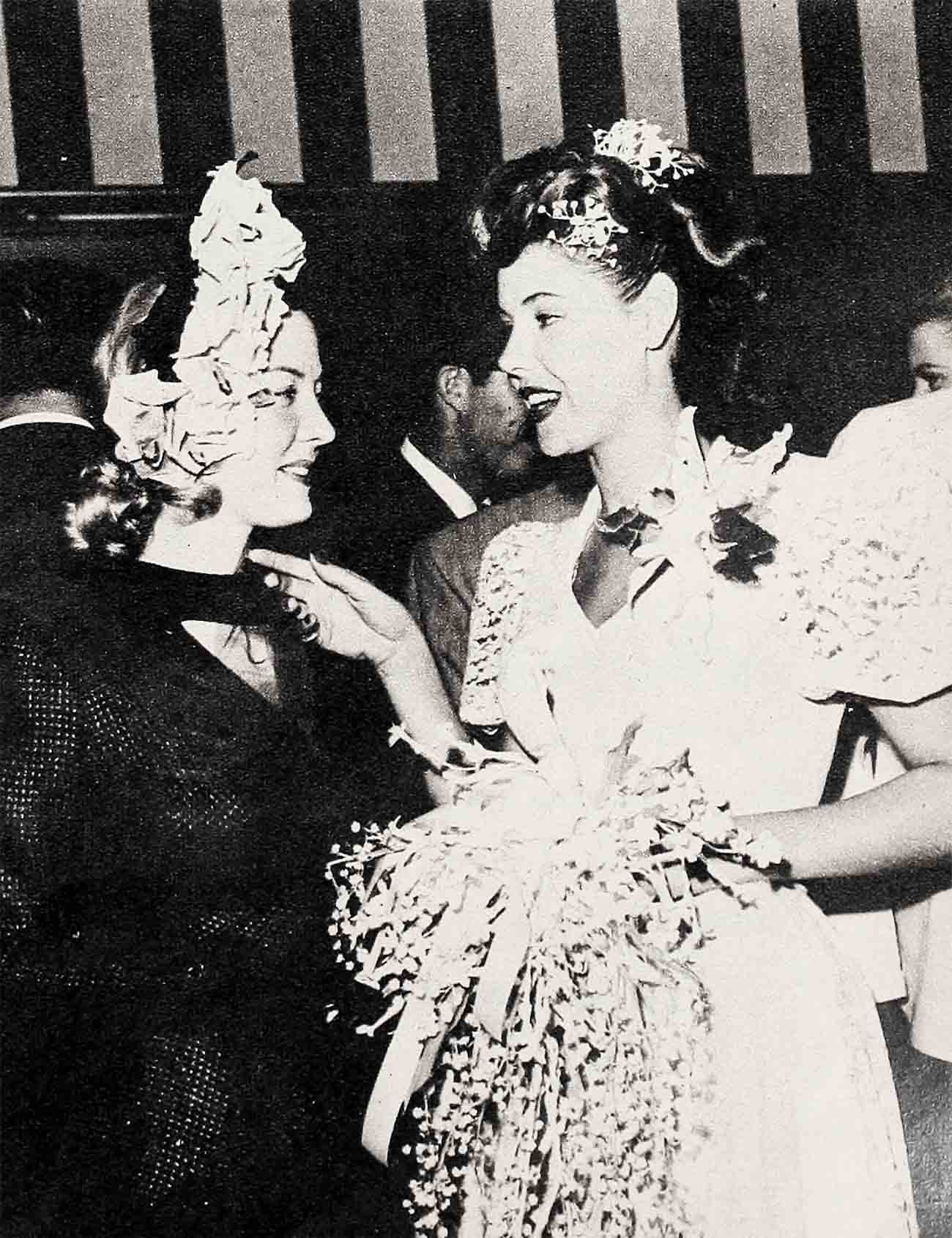
Marie has courage, too. A studio worker told me that during the shooting of one of her pictures she kept telling the producer her character had no motivation.
“See here, my friend,” she declared—and not at the top of her voice— “why don’t we just take my part out of the picture altogether? The girl just doesn’t mean anything to the story.”
The producer smiled gently. He was charmed that such a pretty girl should worry so much about technical matters. The part didn’t change, but almost to the last day, Marie was still attempting to accomplish the impossible.
At length, the reviews came out. One “Miss McDonald gives a capable performance in a role which is completely ing in motivation.”
Marie clipped out the review, circled he single sentence in red, and marched straight into the producer’s office. He still has the clipping, and he’s really a bug on motivation.
The other day I went over to the Metro commissary to have lunch with Marie. Frank Sinatra dropped by to say that his bowling team, comprised of the waitresses, had been beaten the night before by Lana Turner and Clark Gable’s team.
“I’d better call a meeting,” Frank said.
Katy Hepburn moved in, and sat down a few tables away. Bob Taylor was there. So were Greer Garson and Clark Gable.
Visitors stared at the big stars.
They stared just as much at Marie.
It’s obvious that Marie is in the big star classification.
“My guardian angel’s been wonderful this year,” she says. “What with whispering to Harry to pop the question, and the good breaks I’m beginning to get—and being here at all after the day I died for a few hours. I’m pretty sure, knock on wood, that everything’ll be all right.”
The day she “died” was really something.
It was last summer at the beach. Marie decided to go for a dip, while her friends were playing volley ball.
She ran to the edge of the ocean, dove through a big breaker, and started to swim. When she looked up, she noticed big S marks of foam—a rip tide.
The next wave was a beauty.
“I felt like I’d fallen into a cement mixer. When I came up, I yelled, but in another second I was hit again. I had two odd thoughts—darn it, why do I have to go when I’m still so young, and gee, it’s going to hurt my family.”
Marie came up once more. She’d swallowed what seemed like quarts of water. She couldn’t yell, but in the split second that her head showed above the wave, producer Ben Bogeaus spied her. He saw her go under, and he ran. She’d been swept underneath a huge bed of kelp.
Ben, an expert swimmer, was lucky to find her—luckier to get her through the treacherous rip tide. Moments later, she was on the beach, but it was nearly an hour before she showed signs of life.
Marie doesn’t drink, but nobody was thinking about that. Someone poured a tumbler full of brandy down her throat.
“There I’d been a little while before, pathetic and pretty thoroughly drowned. Now there I was again, thoroughly tipsy for the first and only time, and thinking life was wonderful. Life, when you think about it, is wonderful, isn’t it?”
But Mrs. Harry Karl isn’t waiting for your answer to that one. She’s got her own.
THE END
—BY GEORGE BENJAMIN
It is a quote. MODERN SCREEN MAGAZINE DECEMBER 1947




